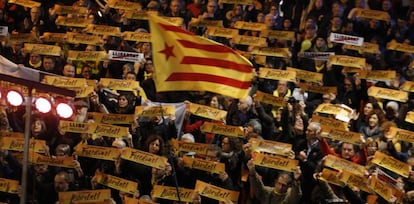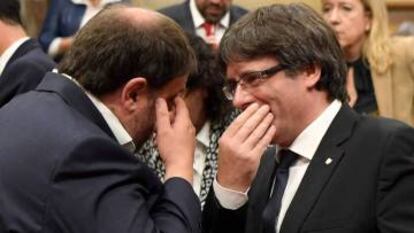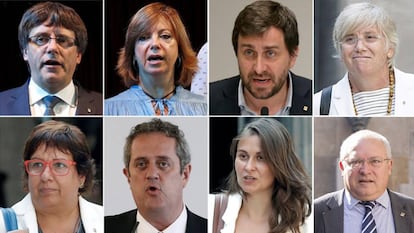Ex-officials in Brussels hold key to separatist majority in Catalan parliament
Separatist bloc needs other party members to fill their vacant spots in regional chamber for key votes

Whether Catalan separatists are able to make use of the majority they achieved at the December 21 elections will largely depend on what happens in Brussels in the coming days.
Four members of the Catalan government that was ousted by Madrid authorities in late October over its illegal breakaway process – Clara Ponsatí, Lluís Puig, Toni Comín and Meritxell Serret – remain in the Belgian capital, where they fled with dismissed premier Carles Puigdemont to avoid action by the Spanish justice system, which is investigating them over alleged rebellion.
If Puigdemont’s bid for the premiership fails, Junqueras will attempt to become the new leader of the Catalan government
All four former ministers ran in a snap election on December 21 in Catalonia called by Madrid using emergency constitutional powers. The election yielded a mixed result: although the anti-independence Ciudadanos won the most votes and the most seats, the three separatist parties together achieved enough deputies for an absolute majority in the regional parliament, which is set at 68 seats out. Puigdemont’s Junts per Catalunya earned 34 deputies, Oriol Junqueras’ Catalan Republican Left (ERC) secured 32, and the far-left CUP won four.
But because all four former ministers of the Puigdemont government have already said they are unwilling to return to Spain, where they would automatically be arrested in connection with the rebellion probe, they will be unable to vote in crucial parliamentary sessions such as the one that will elect the new premier or the members of the permanent council (la Mesa).
Sources familiar with the situation said that all four deputies-elect are negotiating with their parties the possibility of giving up their seat to another party member to make sure that all 70 separatist votes are put to good use.

According to these sources, negotiations are focusing on two issues: first, the role that each one of the ex-ministers will play from now on, if they give up their seats – both within their own party and in any hypothetical executive headed by either Puigdemont or Junqueras. Junqueras, the former deputy premier of Catalonia – also ousted by Madrid – is now in pre-trial detention in a Madrid prison as part of the rebellion investigation, and has appealed to the Supreme Court for his release.
The second item on the negotiation agenda is what kind of support Ponsatí, Puig, Comín and Serret will receive while they remain in Brussels. Sources admitted that financial issues regarding their stay in the Belgian capital have been addressed.
While Puigdemont is in the same situation as his former ministers, he is not expected to give up his seat as he heads the Junts per Catalunya ticket and will likely attempt to get reinstated as Catalan premier despite the fact that he is living 1,300km from Barcelona. This creates an unprecedented situation for which there are no parliamentary provisions, although his party says that a long-distance investiture is possible.
Meanwhile, ERC leader Junqueras is hoping to secure a release from custody so he can attend sessions of parliament and “return to the front lines of politics,” as his lawyer told the Supreme Court at a hearing on Thursday.
Puigdemont or Junqueras?
If Puigdemont’s bid for the Catalan premiership fails, Junqueras will attempt to become the new leader of the Catalan government, a move that comes with its own set of complexities given his own legal situation.
Officials within his own ERC appear to disagree on the suitability of this idea. The ERC’s deputy spokesman in Spanish Congress, Gabriel Rufián, said it was “pure common sense” that Junqueras should become the Catalan premier in the event that Puigdemont “is not able to return” from Belgium, and that this Plan B would be the closest thing to restoring the “legitimate government” of Catalonia.

But another ERC deputy in the Spanish Congress, Ester Capella, said that Puigdemont is the right candidate “for obvious reasons,” and that the results of the December 21 election should not be altered over disputes on matters of legal interpretation. “Plan A, Plan A and Plan A is the possibility for everybody to effectively exercise their political rights fully,” she said.
English version by Susana Urra.
Tu suscripción se está usando en otro dispositivo
¿Quieres añadir otro usuario a tu suscripción?
Si continúas leyendo en este dispositivo, no se podrá leer en el otro.
FlechaTu suscripción se está usando en otro dispositivo y solo puedes acceder a EL PAÍS desde un dispositivo a la vez.
Si quieres compartir tu cuenta, cambia tu suscripción a la modalidad Premium, así podrás añadir otro usuario. Cada uno accederá con su propia cuenta de email, lo que os permitirá personalizar vuestra experiencia en EL PAÍS.
¿Tienes una suscripción de empresa? Accede aquí para contratar más cuentas.
En el caso de no saber quién está usando tu cuenta, te recomendamos cambiar tu contraseña aquí.
Si decides continuar compartiendo tu cuenta, este mensaje se mostrará en tu dispositivo y en el de la otra persona que está usando tu cuenta de forma indefinida, afectando a tu experiencia de lectura. Puedes consultar aquí los términos y condiciones de la suscripción digital.








































